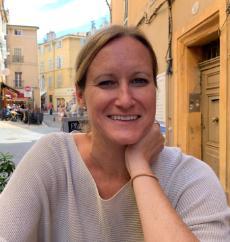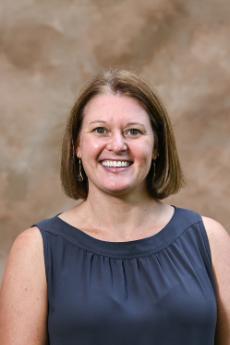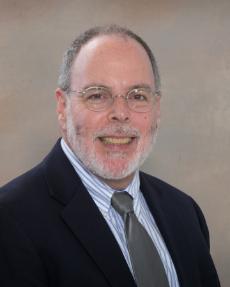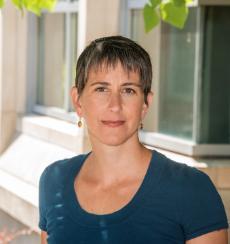Muhlenberg Announces Faculty Promotions
Seven members of the faculty were recently promoted to full professor by the Board of Trustees on the recommendation of President Kathleen Harring and Provost Laura Lowe Furge.By: Kristine Yahna Todaro Monday, May 9, 2022 03:22 PM
-230x230.jpg) Gretchen Gotthard, professor of psychology and neuroscience
Gretchen Gotthard, professor of psychology and neuroscience
Gotthard’s teaching and research focus on learning, memory and applications to psychological disorders.
In her lab, along with her students, she examines how memories are created (consolidated) and modified (reconsolidated) in three organisms—slime mold (Physarum polycephalum), rats and humans.
The ultimate goal of her lab is to apply the work to aspects of treatment for memory-based forms of human psychopathology (e.g., depression and anxiety).
Gotthard earned her Ph.D. from Kent State University in behavioral neuroscience, B.S. from the University of North Dakota in psychology and A.A. from Northland Community College.
 Eileen McEwan, professor of languages, literatures and cultures (French)
Eileen McEwan, professor of languages, literatures and cultures (French)
McEwan’s courses focus on issues of immigration, French language and identity in contemporary France and North America and francophone women writers of Africa and the Caribbean. She also teaches a course on Senegalese hip-hop culture that culminates in a two-week trip to Senegal at the end of the semester. She has taught courses in France several times while directing Muhlenberg's faculty-led program in Aix-en-Provence.
Her research focuses on Quebec and New England as well as Francophone Sub-Saharan Africa and the Caribbean. McEwan is currently working on a book-length manuscript titled Into and Out of Quebec: Re-imagining Migrant Québécois Literature, which explores the literature of contemporary authors who have moved into Quebec alongside texts written by French Canadian authors who left Quebec in the 20th century to work in New England.
She received her Ph.D. from the University of Wisconsin-Madison and M.A. and B.A. from the University of Notre Dame.
022_6846372417_o (1)-230x346.jpg) Cathy Marie Ouellette, professor of history
Cathy Marie Ouellette, professor of history
Ouellette is a historian of Latin America and the Caribbean and teaches courses that focus on race, ethnicity and gender. Her research explores the tensions between regional and national identity in contemporary Brazil. An affiliate faculty in international studies, she also teaches courses on feminism, globalization and the Global South. Ouellette co-teaches a short-term study abroad course on Bodies and Identities in Contemporary Cuba that culminates in travel to Cuba. She has also taken students to Spain, Morocco and a semester in London studying London: a Post-Global City.
Her current scholarship explores the impact of global and integrative learning on student engagement and development in courses exploring race, ethnicity and gender in Latin America and the Caribbean.
Ouellette earned a Ph.D. and M.A. from Emory University, an M.A. from the University of Pittsburgh and a B.A. from Connecticut College.

Thaddeus Robinson, professor of philosophy
As a teacher, Robinson seeks to help students identify and develop their own questions as well as the skills and habits of mind to effectively pursue the answers. One of these skills, which he calls “cooperative engagement," is a form of communication that has at its heart a shared effort to learn, understand, figure out or decide something. To see the value of this form of communication is to recognize that knowledge and understanding are social and that it is to our benefit to seek cooperative engagement and to foster it among others.
Robinson has three broad areas of academic interest: 17th and 18th-century European philosophy, particularly the work of Baruch Spinoza; the philosophy of religion broadly construed; and applied epistemology and the ethics of information.
He received his Ph.D. from Purdue University, M.A. from Northern Illinois University and B.A. from Luther College.
 Stefanie Sinno, professor of psychology
Stefanie Sinno, professor of psychology
Sinno, a developmental psychologist, teaches courses focused on developmental psychology, interpersonal psychology and community engagement.
Her research training and expertise are in the area of social and moral development with a focus on youth social reasoning in everyday contexts. Sinno’s research examines inclusion and exclusion in social contexts, the impact of stereotypes on reasoning and the influence of structural systems on individual well being.
She also has a strong interest in the psychology of teaching and learning, the teaching of interpersonal skills in the classroom and the increased importance of information literacy in understanding psychological research and the representation (or misrepresentation) of psychology in the popular press.
Sinno earned her Ph.D. from the University of Maryland and B.S. from Ursinus College.
Jordanna Sprayberry, professor of biology and neuroscience
Sprayberry is fundamentally interested in how animals work—what drives their behavior, and how their behavior affects evolutionary and ecological relationships. She fulfills these interests with a research program broadly organized around the neuroethology of pollination, how sensory processing of pollinators drives behavior, as well as relevant plant-insect interactions.
She utilizes diverse techniques in her pursuit of these questions, including computational analysis, neurophysiology, field studies and behavior. Sprayberry also actively involves student researchers in the process—providing them with a diverse experimental and analytical toolkit.
She is interested in teaching students how and why biological systems work the way they do: exploring common ideas between ecosystems and organ systems in biology; exploring what makes bodies run and how they adapt to different conditions and environments in physiology; helping students understand how information manifests in neurons as well as how it is used to drive behavior in neuroscience.
Sprayberry earned her Ph.D. from the University of Washington and B.S. from the University of Rhode Island. She was also a postdoctoral fellow at the University of Washington and the University of Arizona.
 Mark Stein, professor of history
Mark Stein, professor of history
Stein teaches history for the same reasons he was drawn to it: a desire to understand the societies and civilizations of the past in order to better understand the present. In his teaching, he focuses not only on the events and peoples of the past but also on the methods that historians use to uncover those details. Stein’s emphasis is on the history of the Middle East, a widely misunderstood region yet one that is vital to the highly interconnected, globalized world.
His research focus is the social and economic history of the Ottoman Empire. This is a broad area, as the Ottomans ruled the Middle East and Southeastern Europe for more than 600 years. Specifically, he is investigating the military frontier between the Ottomans and the Habsburg Empire in Hungary in the 17th century.
Stein received his Ph.D. and M.A. from the University of Chicago and B.A. from Northwestern University.
About Muhlenberg College
Founded in 1848, Muhlenberg is a highly selective, private liberal arts college offering baccalaureate and graduate programs. With an enrollment of nearly 2,000 students, Muhlenberg College is dedicated to shaping creative, compassionate, collaborative leaders through rigorous academic programs in the arts, humanities, natural sciences and social sciences; selected preprofessional programs, including accounting, business, education and public health; and progressive workforce-focused post-baccalaureate certificates and master’s degrees. Located in Allentown, Pennsylvania, approximately 90 miles west of New York City, Muhlenberg is a member of the Centennial Conference, competing in 23 varsity sports. Muhlenberg is affiliated with the Evangelical Lutheran Church in America.

